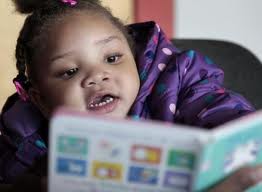Dinner conversations can be lively. They can be serious. And, they can be thought-provoking. But, did you know that dinner conversations can also help to develop literacy skills? Yes, simply talking at the table can help nurture your child’s literacy development. I have learned loads about literacy development during my 17 years in early childhood and elementary education. As a mom, I’m now transferring that knowledge to my own dinner table. Let’s look at four literacy benefits that stem from dinner conversations:
 1. Conversations build our vocabulary. Everyday conversation is full of new vocabulary for younger children. You can work in new vocabulary words to discuss at the table too. For example, fill a jar with new or interesting words that your family finds through their reading or experiences. Each night, select a word to discuss. Each person at the table can state the definition in their own words and then use it in a sentence or story. The more times the word is “practiced,” the sooner it will become part of your normal conversation. You might also enjoy the read-aloud Donovan’s Word Jar by Monalisa DeGross which is about a young boy who collects interesting words.
1. Conversations build our vocabulary. Everyday conversation is full of new vocabulary for younger children. You can work in new vocabulary words to discuss at the table too. For example, fill a jar with new or interesting words that your family finds through their reading or experiences. Each night, select a word to discuss. Each person at the table can state the definition in their own words and then use it in a sentence or story. The more times the word is “practiced,” the sooner it will become part of your normal conversation. You might also enjoy the read-aloud Donovan’s Word Jar by Monalisa DeGross which is about a young boy who collects interesting words.
2. Listening and participating in conversations helps to build reading fluency. Children learn how language sounds when speaking and listening. Expression and inflection are modeled and practiced. These oral language skills transfer over to a child’s reading.
3. Oral storytelling at the dinner table can translate into written stories later. Many young writers need to “talk out” their stories before they write. Using the dinner table as a stage for these performances is very powerful. Others at the table can encourage the storyteller to add details or question things that are unclear. You might want to make placemats for everyone filled with question/statement cues. This helps to teach kids how to respond when someone is sharing a story. Cues could include: Tell us more about…, I like the part about…, A part that was unclear to me was…, I have a question about…
 4. Talking about books you are reading demonstrates that reading is important in your household, which helps to instill a love of reading in your children. During dinner, encourage everyone to share what they are reading. You can even talk about if the books are too easy or too hard and how readers deal with each of those scenarios. Different family members can even recommend books to other family members. Everyone begins to learn about the reading interests of each other! So not only will you reap all the other benefits of family dinner conversations such as getting to know each other better, strengthening relationships and exploring what matters to you and your family, but you also help to enhance your child’s literacy skills! The Family Dinner Project has some great conversation starters, and if you’d like some more (particularly focused on the literacy aspect), check out my year-long series- Table Topics from my blog, Growing Book by Book. Happy Talking!
4. Talking about books you are reading demonstrates that reading is important in your household, which helps to instill a love of reading in your children. During dinner, encourage everyone to share what they are reading. You can even talk about if the books are too easy or too hard and how readers deal with each of those scenarios. Different family members can even recommend books to other family members. Everyone begins to learn about the reading interests of each other! So not only will you reap all the other benefits of family dinner conversations such as getting to know each other better, strengthening relationships and exploring what matters to you and your family, but you also help to enhance your child’s literacy skills! The Family Dinner Project has some great conversation starters, and if you’d like some more (particularly focused on the literacy aspect), check out my year-long series- Table Topics from my blog, Growing Book by Book. Happy Talking!
p.s. If you are interested in learning more about the literacy skills I’ve shared, please see the work of Katie Wood Ray (writing), Isabel Beck (vocabulary) and Richard Allington (reading). They are just a few of the researchers whose work I’ve used to grow my expertise on literacy development.
 Jodie Rodriguez is a National Board Certified teacher, reading specialist and administrator with over 17 years of experience. She currently stays at home with her two young sons (2.5 years and 14 months). Her newest adventure is the creation of the Growing Book by Book blog dedicated to helping caregivers nurture young readers. You can also connect with her on Facebook and Pinterest.
Jodie Rodriguez is a National Board Certified teacher, reading specialist and administrator with over 17 years of experience. She currently stays at home with her two young sons (2.5 years and 14 months). Her newest adventure is the creation of the Growing Book by Book blog dedicated to helping caregivers nurture young readers. You can also connect with her on Facebook and Pinterest.
